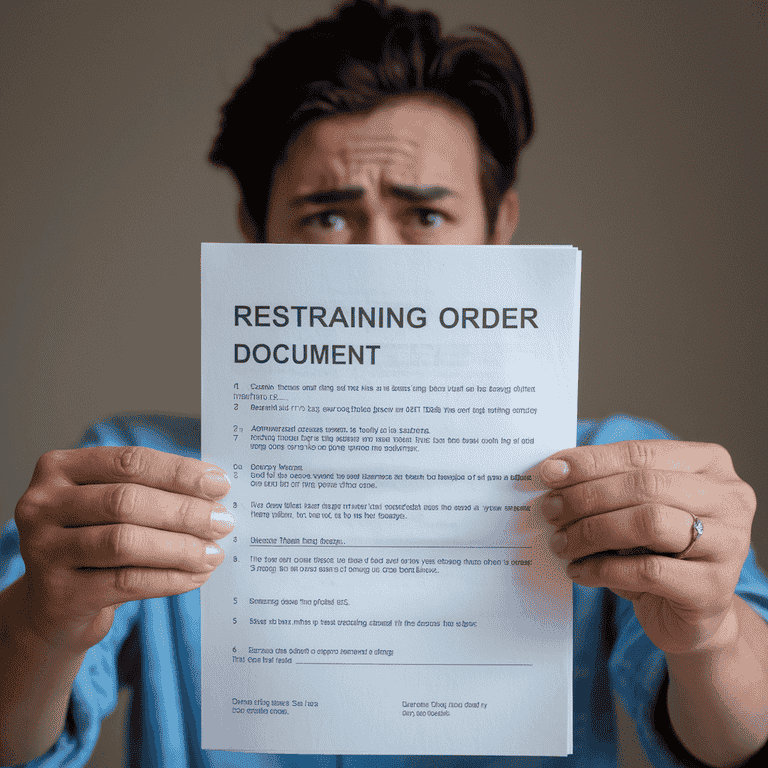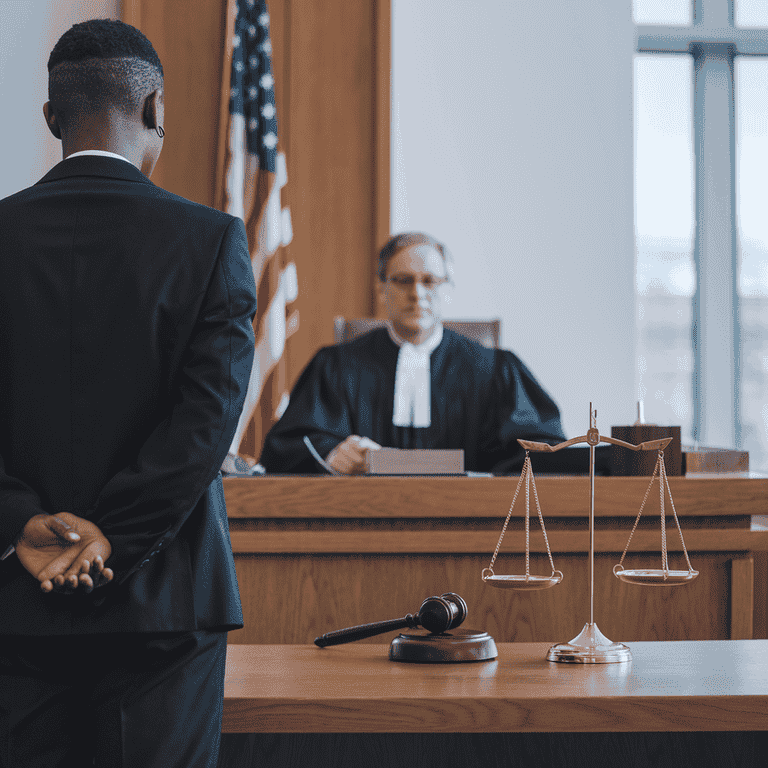If you’ve been served with a restraining order that you believe is unjust, it’s critical to take it seriously. Restraining orders can have significant legal and personal consequences, even if the claims made against you are false or exaggerated. Understanding the legal process in Las Vegas, the types of restraining orders, and how to defend yourself is essential.
In this guide, we’ll break down what a restraining order is, the common reasons unjust restraining orders are issued, and the steps you can take to protect yourself.

What Is a Restraining Order in Las Vegas?
In Las Vegas, a restraining order is a court-issued document that legally restricts a person from contacting or approaching another individual. Restraining orders are typically requested by someone who claims they are being harassed, stalked, or abused. They can be an essential tool for protection, but sometimes they are used unfairly or without proper justification.
Types of Restraining Orders in Las Vegas
There are different types of restraining orders that can be issued in Las Vegas, each serving a specific purpose.
- Temporary Protective Orders (TPO): These are short-term orders that can be issued without the accused present in court. They generally last up to 30 days and provide immediate protection while a more permanent solution is determined.
- Extended Protective Orders: If a judge decides the situation warrants continued protection, a temporary order can be extended for up to one year. This order offers longer-term protection and involves a full hearing where both parties present evidence.
Domestic Violence vs. Civil Harassment Restraining Orders
- Domestic Violence Restraining Orders: These orders are typically issued in cases involving family members, partners, or people living together. They are common in disputes involving allegations of abuse within intimate or family relationships.
- Civil Harassment Restraining Orders: These orders are for situations involving people who do not have a domestic relationship, such as neighbors, coworkers, or acquaintances. They are used when someone feels harassed or threatened by another person, even if they do not live together or have a family connection.
Legal Implications of a Restraining Order
Having a restraining order against you can have serious consequences. Violating a restraining order can lead to criminal charges, jail time, and fines. Even if the restraining order is unjust, following its terms strictly is crucial until you can challenge it in court.

Common Reasons for Unjust Restraining Orders
Unfortunately, not all restraining orders are filed for legitimate reasons. In some cases, restraining orders are sought for purposes other than protection.
Personal Disputes
Sometimes, restraining orders are used as a weapon in personal disputes. These might include arguments between neighbors, coworkers, or ex-friends. A person may file an order to escalate the situation or gain leverage.
False Allegations of Harassment or Abuse
In some cases, people falsely accuse others of harassment or abuse to gain the upper hand in another legal matter, such as a divorce or custody battle. False accusations can be difficult to defend against, but it is possible with the proper evidence.
Misunderstandings or Lack of Evidence
Occasionally, restraining orders are issued based on misunderstandings or miscommunications. For instance, someone may feel threatened by behavior that was not intended to be harmful. The restraining order may be unjust if no solid evidence supports the claim.
Strategic Use in Divorce or Custody Cases
Restraining orders are sometimes used strategically in divorce or custody cases. One party may use a restraining order to gain an advantage in child custody, property division, or alimony negotiations by painting the other party in a negative light.

Immediate Steps to Take if Served with a Restraining Order
Being served with a restraining order can be overwhelming, especially if you feel it’s unjust. However, staying calm and taking immediate steps to protect yourself is essential. What you do next can significantly impact your ability to defend against the order.
Read the Restraining Order Carefully
The first step is to read the restraining order thoroughly. It will contain crucial details, including:
- The restrictions imposed on you (e.g., not contacting or approaching the petitioner)
- The length of time the order is in effect
- The date and time of the court hearing, if one is scheduled
Make sure you understand precisely what you are prohibited from doing. Even if you believe the order is unfair, you must follow it strictly until you can challenge it in court.
Understand the Restrictions Placed on You
The restraining order will specify what actions you are restricted from taking. This might include:
- No-contact orders prohibit direct or indirect contact with the petitioner (via third parties or social media).
- Stay-away orders require you to avoid specific locations, such as the petitioner’s home, workplace, or other designated areas.
- Child custody restrictions: In some cases, the order might temporarily limit or restrict your access to your children.
Failing to comply with these restrictions, even unintentionally, can result in criminal charges.
Adhere Strictly to the Terms of the Order
Regardless of your feelings about the restraining order, following it to the letter is crucial. Violating the order will harm your defense and lead to criminal charges, fines, or even jail time. Document your activities and avoid any potential conflicts with the petitioner.
Gather and Preserve Evidence Supporting Your Defense
To fight an unjust restraining order, you’ll need evidence to support your case. Start gathering any relevant documentation that shows the claims against you are false or exaggerated. This might include:
- Text messages, emails, or social media messages that show the petitioner’s intent or lack of threat
- Witnesses who can testify to your character or the events in question
- Photos or videos that demonstrate your actions or whereabouts during alleged incidents
The sooner you gather this evidence, the stronger your defense will be.

Legal Process for Defending Against a Restraining Order in Las Vegas
Understanding the legal process for restraining orders in Las Vegas will help you prepare for what’s ahead. Several stages are involved, and knowing what to expect can reduce stress and improve your chances of a favorable outcome.
How the Restraining Order Process Works in Nevada
The restraining order process in Nevada typically follows these steps:
- Filing the Request: The petitioner files for a temporary restraining order (TPO), usually without you being present.
- Issuance of TPO: The judge may issue the TPO based on the petitioner’s statements alone, without hearing your side of the story.
- Service of the TPO: You will be served with the TPO and informed of a court hearing where you can defend yourself.
- Court Hearing: At the hearing, you and the petitioner will have the opportunity to present evidence. The judge will decide whether to extend the order or dismiss it.
Preparing for the Hearing
Preparing for the restraining order hearing is crucial. Here are some steps to take:
- Consult an Attorney: If possible, hire a lawyer specializing in restraining order defense. They can help you prepare your case and ensure your rights are protected.
- Gather Evidence: As mentioned earlier, collect any documentation, witness statements, or other evidence that disproves the petitioner’s claims.
- Prepare Your Testimony: Plan what you will say at the hearing. Stick to the facts and avoid emotional or defensive statements. Be clear, calm, and concise.
What to Expect at the Hearing
During the hearing, you will have the opportunity to present your side of the story. Here’s what typically happens:
- Opening Statements: Both parties may give a brief overview of their case.
- Presentation of Evidence: The petitioner will present their evidence first, followed by your defense. This may include witness testimony, documents, and any other supporting materials.
- Cross-Examination: You or your attorney may have the chance to question the petitioner and their witnesses to challenge their credibility or statements.
- Judge’s Decision: After hearing both sides, the judge will decide whether to dismiss the restraining order, extend it, or modify its terms.
Possible Defenses Against an Unjust Restraining Order
You have the right to defend yourself against an unjust restraining order. There are several strategies your attorney can use to challenge the petitioner’s claims.
Lack of Evidence or Proof of the Petitioner’s Claims
The petitioner must provide sufficient evidence to prove their allegations. If their claims are vague, lack detail, or are unsupported by physical evidence or witnesses, your attorney can argue that the restraining order is unjustified.
False Accusations or Malicious Intent
In some cases, restraining orders are filed based on false accusations. Demonstrating that the petitioner has a motive to lie or has made similar false claims in the past can weaken their credibility. This is especially common in divorce or custody disputes, where one party might use a restraining order as leverage.
Alibi or Evidence Showing No Wrongdoing
If the petitioner claims that a specific incident occurred, you may be able to present an alibi proving you were elsewhere at the time. Any documentation—such as GPS data, receipts, or witness testimony—showing that you were not involved in the alleged incident can be crucial to your defense.
Witness Testimony Supporting Your Innocence
If others witnessed the events in question and can testify that the petitioner’s version is inaccurate or false, their testimony can be a powerful tool in your defense. Witnesses can provide an outside perspective that helps clarify the situation.
Misidentification or Mistaken Identity
In some cases, the petitioner may have misidentified you as the person responsible for harassment or abuse. If you believe this is the case, you can present evidence that someone else may have been responsible or that the petitioner has made a mistake.

How a Restraining Order Affects You
Being subject to a restraining order, even an unjust one, can have severe and far-reaching consequences. Beyond the immediate legal restrictions, the impact can ripple into various aspects of your personal, professional, and family life.
Impact on Employment and Reputation
A restraining order can tarnish your reputation, mainly if your job involves background checks or working with vulnerable populations like children or older people. Even if the restraining order is based on false claims, having it on your record can:
- Limit your ability to get specific jobs.
- Harm your relationships with colleagues or employers.
- Affect your credibility and standing in your community.
Employers may sometimes terminate or suspend you, especially if the allegations involve violence or harassment. It’s essential to act quickly to challenge the order to minimize long-term damage to your career.
Restrictions on Your Movements and Daily Activities
A restraining order can impose strict limitations on where you can go and what you can do. Common restrictions include:
- If they are involved, children should be prohibited from visiting specific locations, like the petitioner’s home, workplace, or even schools.
- There are no contact orders preventing you from speaking to the petitioner in person, by phone, or through other means, like social media.
- Limitations on attending shared events, such as family gatherings or community spaces.
Failure to follow these restrictions, even unintentionally, can result in legal consequences. You may face fines, criminal charges, or even jail time if the court believes you violated the order.
Impact on Child Custody or Visitation Rights
One of the most devastating impacts of a restraining order can be on your relationship with your children. If the petitioner is your children’s other parent or your child is included in the order, your access to them may be severely limited. A restraining order can:
- Result in temporary loss of visitation rights.
- Restrict where and how visitation occurs (e.g., supervised visitation).
- This impacts future custody arrangements, as courts may factor the restraining order into their decisions.
If the restraining order is unjust, fighting it to protect your parental rights is critical.
Potential Criminal Charges for Violating the Order
Violating a restraining order, even accidentally, can lead to severe consequences. Nevada takes violations seriously, and you may face:
- Fines: Violations can result in hefty fines, depending on the severity of the breach.
- Jail Time: Jail time is a real possibility for more serious violations, such as direct contact with the petitioner or repeated violations.
- Criminal Record: Violating a restraining order can leave you with a permanent criminal record, further impacting your ability to find work, secure housing, or maintain custody of your children.

Hiring an Attorney to Fight an Unjust Restraining Order
Having the proper legal representation is essential when facing an unjust restraining order. A skilled attorney can help you navigate the legal process, present a strong defense, and protect your rights.
Why Legal Representation Is Essential
A restraining order hearing is a legal proceeding with high stakes. Without legal representation, you risk missing critical legal arguments or failing to present evidence compellingly. An experienced attorney will:
- Understand Nevada’s specific laws regarding restraining orders.
- Know how to challenge the petitioner’s evidence effectively.
- Help ensure you comply with all procedural requirements to avoid technical errors that could hurt your case.
Most importantly, an attorney can fight to dismiss or significantly reduce the restraining order, potentially protecting your reputation, job, and family relationships.
How an Attorney Can Help Build a Strong Defense
A defense attorney can gather evidence, identify witnesses, and prepare legal arguments to challenge the restraining order. Some of the ways an attorney will help include:
- Reviewing the Restraining Order: Your attorney will carefully review the terms of the order to understand the restrictions and build a strategy.
- Investigating the Petitioner’s Claims: By examining the petitioner’s allegations, your attorney can identify weaknesses or inconsistencies that may discredit their case.
- Preparing Your Testimony: Your attorney will help you practice presenting your side of the story clearly and persuasively during the hearing.
- Presenting Evidence and Witnesses: Your attorney can help secure and present evidence, such as text messages, emails, photos, or alibi witnesses, to refute the petitioner’s claims.
Essential Qualities to Look for in a Defense Attorney Specializing in Restraining Orders
When hiring an attorney, it’s crucial to find someone who understands the complexities of restraining order cases and has experience defending clients in similar situations. Look for the following qualities:
- Experience: A lawyer with expertise in restraining order cases will know the local courts, the judges, and the typical legal strategies in Las Vegas.
- Specialization in Family or Criminal Law: Depending on the nature of your case (e.g., domestic violence vs. civil harassment), look for an attorney with expertise in either family law or criminal defense.
- Good Communication Skills: Your attorney should be easy to communicate with and explain complex legal concepts in a way you can understand.
- Proven Track Record: Ask about the attorney’s success rate in defending against restraining orders. Have they successfully had orders dismissed or reduced?
Working with Your Attorney to Gather Evidence and Prepare for Court
Your attorney will need your cooperation to build the most robust possible defense. Here are some ways you can help:
- Provide All Relevant Information: Be upfront about any communication, arguments, or interactions with the petitioner, even if it might hurt your case. Your attorney needs to know everything to defend you effectively.
- Help Identify Witnesses: Consider people who can speak to your character, provide an alibi, or refute the petitioner’s claims.
- Collect Documentation: Gather any messages, emails, or other documents that support your version of events. If the petitioner has contacted you since filing the restraining order, provide this evidence to your attorney.
Filing a Motion to Dismiss or Modify the Restraining Order
If the restraining order is unjust, your attorney can file a motion to dismiss or modify the order. This is an essential step in fighting against false or exaggerated claims.
Grounds for Filing a Motion to Dismiss
You can file a motion to dismiss the restraining order if:
- There’s insufficient evidence to support the petitioner’s claims.
- The allegations are false, and you can provide proof that discredits the petitioner’s story.
- The restraining order was filed maliciously to gain leverage in another legal matter, such as a custody dispute or divorce.
Your attorney will present these arguments to the court and attempt to have the order dismissed outright.
Steps to Take if You Need the Order Modified
If the court refuses to dismiss the order, your attorney may be able to file a motion to modify its terms. This could involve:
- Reducing the scope of the order, such as allowing limited contact in specific situations (e.g., exchanging children for visitation).
- Shortening the duration of the restraining order.
- Removing unnecessary restrictions, such as those related to specific locations or events that don’t pose a legitimate risk.
How to Present a Strong Case for Dismissal or Modification
You’ll need to present robust and convincing evidence to have a good chance of getting the restraining order dismissed or modified. This can include:
- Eyewitness testimony contradicting the petitioner’s claims.
- Documents or recordings that disprove the allegations.
- Character witnesses who can vouch for your behavior and challenge the petitioner’s credibility.
Your attorney will help you prepare and present this evidence effectively in court.

What Happens If the Restraining Order Is Upheld?
If the court upholds the restraining order, it can have severe implications for your life. Understanding what happens next is crucial for navigating this challenging situation.
Understanding the Consequences of a Sustained Restraining Order
When a restraining order is upheld, you need to be aware of the following potential consequences:
- Duration of the Order: Depending on the judge’s decision, the restraining order may remain in effect for a specific period, often up to one year. In some cases, it can be renewed or made permanent.
- Legal Restrictions: You will be bound by the terms of the order. This may include prohibitions against contacting the petitioner or visiting certain places. Any violation can lead to legal consequences.
- Impact on Future Legal Matters: A restraining order on your record can affect future legal issues, such as custody disputes, employment opportunities, or any new legal actions. Courts may view you differently if a restraining order exists, which can influence their decisions.
Options for Appeal
If the restraining order is upheld, you may have the option to appeal the judge’s decision. Here’s what you should know about the appeals process:
- Grounds for Appeal: You can appeal based on procedural errors, lack of evidence, or other legal issues. If you believe the judge made a mistake, it’s essential to outline these points clearly.
- Time Limit: Appeals typically have strict time limits. In Nevada, you often have 30 days from the hearing date to file your appeal, so acting quickly is critical.
- Legal Representation: Engaging an attorney with experience in appeals is vital. They can guide you through the process and help present a compelling case to the appellate court.
The Appeal Process and What to Expect
If you decide to pursue an appeal, here’s a brief overview of what to expect:
- Filing the Notice of Appeal: Your attorney will file a notice of appeal with the appropriate court, outlining the grounds for your appeal.
- Record Preparation: The court will compile a record of the original case, including transcripts, evidence, and other relevant documents.
- Written Briefs: Both parties will submit written briefs to the appellate court. Your brief will argue why the original decision should be overturned, while the petitioner will defend the judge’s ruling.
- Oral Arguments: In some cases, the appellate court may schedule a hearing where both sides can present their arguments. This is an opportunity to clarify points and answer any questions from the judges.
- Judgment: After reviewing the briefs and hearing oral arguments, the appellate court will issue a decision. They may uphold the original order, modify it, or reverse it entirely.

Can You Sue for Damages Due to a False Restraining Order?
If you’ve been wrongfully subjected to a restraining order, you might wonder if you can take legal action against the person who filed it. In some cases, pursuing a civil lawsuit for damages may be an option.
Exploring Your Options for Filing a Countersuit
Filing a countersuit can be a way to hold the petitioner accountable for their actions. Here are some possible claims you might consider:
- Defamation or Slander: If the petitioner made false statements about you that harmed your reputation, you could sue for libel. This claim argues that their statements were false and damaging.
- Malicious Prosecution: If the restraining order was filed with malicious intent, knowing it was false, you might have grounds for a malicious prosecution claim. This requires proving that the petitioner acted with ill intent and that the restraining order was without merit.
When It Makes Sense to Pursue Legal Action Against the Petitioner
Before deciding to pursue legal action against the petitioner, consider the following factors:
- Evidence: Ensure you have strong evidence to support your claims. This can include documentation of false statements or proof that the restraining order was maliciously filed.
- Cost and Time: Lawsuits can be time-consuming and expensive. Weigh the potential benefits against the resources required to pursue a countersuit.
- Personal Considerations: Think about the personal impact of pursuing legal action. This decision can lead to prolonged conflict and stress, so ensure you are prepared for the emotional toll.
Tips for Avoiding Violations of the Restraining Order
Navigating life with a restraining order in place requires caution and awareness. To avoid accidental violations, consider these helpful tips:
Following the Terms of the Order Strictly
- Read and Understand the Order: Ensure you are fully aware of all the restrictions imposed. Ignorance of the order is not a valid defense in court.
- Create a Compliance Plan: Develop a personal plan to adhere to the order. This might involve changing your routines or avoiding certain places where the petitioner might be.
Avoiding All Direct or Indirect Contact with the Petitioner
- No Contact: Do not attempt to communicate with the petitioner in any form. This includes phone calls, texts, emails, or even social media messages.
- Third Parties: Avoid using friends or family members to send messages to the petitioner. This is considered indirect contact and can still lead to legal repercussions.
Keeping Detailed Records of Your Actions
- Document Everything: Keep a log of your daily activities, mainly where you go and who you interact with. If you encounter the petitioner or are accused of a violation, this documentation can serve as evidence in your defense.
- Witnesses: Identify friends or family who can vouch for your compliance with the restraining order. Their testimonies can be helpful if questions arise.
Reporting Any False Claims of Violations Immediately
If the petitioner falsely claims you violated the restraining order, act quickly:
- Document the Claim: Write down the details of the incident and any witnesses present.
- Inform Your Attorney: Notify your attorney about the false claim. They can help you address the situation and prepare a defense.

Breaking It Down
Defending against an unjust restraining order in Las Vegas can feel daunting, but understanding your rights and the legal process is the first step in reclaiming your life. By knowing what to expect, gathering evidence, and seeking skilled legal representation, you can effectively challenge the order and protect your reputation.
Remember, navigating this situation requires careful attention to detail and strict adherence to the order terms. Stay calm, be proactive, and take the necessary steps to uphold your rights. If you are in this situation, don’t hesitate to seek legal guidance—your future may depend on it.

Additional Resources for You
Molly Rosenblum, Esq., our lead attorney, extends her expertise beyond the realm of family and estate law by offering a robust suite of resources for those facing criminal charges. Recognizing the challenges and complexities of the criminal justice system, Molly Rosenblum has developed these resources to aid individuals in navigating their legal battles with informed confidence. Here’s a concise guide to the resources available, each designed to address the nuances of different areas of criminal law:
-
Criminal Defense Attorneys: Comprehensive support and legal representation for a wide range of criminal charges, ensuring robust defense strategies tailored to your case. Explore defense options.
-
Las Vegas DUI Lawyer: Specialized legal assistance for DUI charges in Las Vegas, offering expert advice and representation to minimize the impact of DUI allegations. Learn about DUI defense.
-
Domestic Violence Lawyer Las Vegas: Dedicated support for individuals accused of domestic violence, providing legal strategies to address the charges. Get domestic violence support.
-
Drug Possession Lawyer: Expert legal representation for drug possession charges, aiming to protect your rights and achieve the best possible outcome. Address drug charges.
-
Sex Crimes Attorney: Specialized defense for those accused of sex crimes, offering discreet and aggressive representation to challenge the allegations. Explore sex crime defense.
-
CPS Defense Attorney: Assistance for cases involving child protective services, including allegations of child abuse and neglect. Get CPS defense.
-
Misdemeanor Lawyer: Legal support for misdemeanor charges, focusing on minimizing penalties and protecting your record. Learn about misdemeanor defense.
-
Juvenile Defense Lawyers: Dedicated representation for minors facing criminal charges, working towards outcomes that protect the minor’s future. Find juvenile defense assistance.
-
Las Vegas Warrant Defense Attorney: Guidance and legal action to address outstanding warrants, aiming to resolve them with minimal legal consequences. Address warrants effectively.
-
Las Vegas Probation Violation Attorney: Expertise in handling probation violation issues, offering strategies to avoid severe penalties. Navigate probation violations.
-
Theft Crime Defense Lawyer: Defense strategies for those accused of theft, focusing on disproving allegations or minimizing penalties. Defend against theft charges.
-
Kidnapping Lawyers: Specialized legal assistance for kidnapping allegations, offering aggressive defense tactics. Get kidnapping defense.
-
Firearms Lawyer Las Vegas: Representation for firearms-related charges, ensuring your rights are defended in accordance with the law. Learn about firearms defense.
Molly Rosenblum, Esq. and her team are committed to providing rigorous, informed legal representation across a spectrum of criminal charges. Each of these resources is designed to offer clarity, support, and expert legal advice to those facing the daunting prospects of criminal litigation. We encourage you to leverage these resources, ensuring you are well-prepared and represented in your legal matters.
General Queries
Understanding the Need for Representation: Determine if you require legal assistance with our article, Do You Need Legal Assistance for Misdemeanor Charges?
– The Arraignment Process: Navigate through The Nevada Arraignment – FAQ for answers to common questions about the initial court process.
Specific Charges
Felony Concerns
Delve into articles like Understanding Felonies in Nevada, Strategies for Winning Felony Cases, Q&A on Miranda Rights, and more.
Drug-related Offenses
Access comprehensive Q&A on Marijuana Possession and our Drug Possession Defense guide.
Firearms and Theft
Familiarize yourself with our Firearms Defense and Theft Defense content.
Sex Crimes
Consult our expert team of Sex Crime Defense Attorneys.
Traffic Violations
Review our detailed page on Nevada Traffic Tickets.
Solicitation & Prostitution
Read our guide titled, “Need Help with Solicitation Charges?“
Shoplifting Charges
Stay updated with “Understanding Nevada Shoplifting Laws.”
Special Situations
Juvenile Issues
If a minor is involved, refer to our articles on Juvenile Defense Lawyers and Expert Advice on Juvenile Charges.
Warrant Concerns
Our “Warrant Defense Attorneys” guide sheds light on how to address outstanding warrants.
Sealing Records
Learn the process with our “Comprehensive Guide to Sealing Criminal Records in Nevada.”
Remember, our website is a treasure trove of legal insights. Should you need personalized legal counsel, please connect with us.

Frequently Asked Questions
What should I do if I believe the restraining order is based on lies?
If you believe the restraining order is founded on falsehoods, gather evidence to support your case. This can include text messages, emails, or witness statements. Consult an attorney to discuss your options for challenging the order.
Can I contact the petitioner to see if the restraining order has been dropped?
You can contact the petitioner once the court officially dismisses the restraining order. However, ensure that the dismissal is documented and that you understand any conditions that may have been part of the court’s decision.
How long does a restraining order typically last in Nevada?
A Temporary Protective Order (TPO) usually lasts up to 30 days, while an Extended Protective Order can last up to one year. The order can sometimes be renewed if the court finds it necessary.
What evidence is necessary to prove the restraining order is unjust?
Evidence can vary depending on the specifics of your case. Still, common types include text messages, social media interactions, witness testimonies, video recordings, or any documentation contradicting the petitioner’s claims.
Can I prevent the filing of a restraining order against me?
While you cannot completely prevent someone from filing a restraining order, maintaining healthy communication and resolving disputes amicably can reduce the likelihood of such actions. If someone is considering this, addressing the issues early may help.
Can I appeal a restraining order if I am unsatisfied with the court’s decision?
Yes, if the court upholds the restraining order and you believe there were legal errors or insufficient evidence, you can file an appeal. You must do this within the specified time frame, usually within 30 days of the ruling.
What happens if the petitioner violates the restraining order?
If the petitioner violates the terms of the restraining order, you can report this to law enforcement. Please record the violation, as it may be used in future legal proceedings. You may also want to consult your attorney about your options for addressing the breach.
Will having a restraining order affect my ability to own a firearm?
In Nevada, having a restraining order related to domestic violence can affect your ability to possess a firearm. Consult legal counsel to understand how the order may impact your rights.
Can I request a restraining order against someone who has wrongfully accused me?
Yes, if you believe someone is making false allegations against you and it threatens your safety, you can seek a restraining order against that individual. This process involves filing the appropriate legal documents and providing evidence of the threats or harassment.
How can I prepare for the emotional impact of dealing with a restraining order?
Dealing with a restraining order can be emotionally taxing. Consider seeking support from friends, family, or a mental health professional. Connecting with supportive people can help you cope with the stress and uncertainty.
Why You Haven’t Already Hired a Defense Attorney to Help You
Watch this short video to take the next big step toward defending your rights against your felony charge.

Offsite Resources You May Find Helpful
Here are some resources that can provide more information and support for those seeking to understand the basics of restraining orders in Las Vegas, Nevada:
- Nevada State Bar Association: The official site of the Nevada State Bar, which includes a directory of licensed attorneys in Nevada and resources on Nevada law.
- Clark County Courts: Official website of the Clark County Courts, where Las Vegas is located. It provides information on how to obtain a restraining order.
- Avvo – Las Vegas Restraining Order Attorneys: Avvo provides a directory of lawyers who specialize in restraining orders in Las Vegas, along with user ratings and reviews.
- Justia – Nevada Protective Order Laws: Justia provides a directory of lawyers who handle protective order cases in Nevada, along with their profiles containing information about their education, awards, and professional associations.
- FindLaw – Nevada Protective Order Laws: FindLaw provides a comprehensive overview of protective order laws in Nevada.
- SAFE House Nevada: SAFE House Nevada is a nonprofit organization dedicated to stopping abuse in the family environment. They can provide assistance and resources to individuals seeking to obtain a restraining order.

What’s Next?
Are you living in Las Vegas and need to hire a Las Vegas criminal defense attorney?
Don’t worry, The Rosenblum Allen Law Firm has got you covered!
Our team of experienced attorneys will work tirelessly on your case. Plus, we are dedicated to providing excellent customer service – making it easy for anyone looking for legal advice or support.
When you choose the Rosenblum Allen Law Firm as your advocate, know that no stone will be left unturned when defending your rights and fighting any charges against you.
So don’t wait – get the best possible defense here at The Rosenblum-Allen law firm today! Call us now at (702) 433-2889 —we can’t wait to hear from ya!





